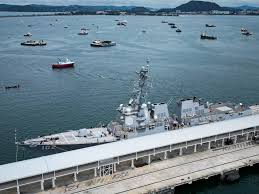
US Military Strike Kills 11 in Caribbean Drug Operation Tied to Venezuelan Cartel Trump Announces
Washington, D.C. — U.S. President Donald Trump has announced that American military forces conducted a “kinetic strike” against a suspected drug-trafficking vessel in the southern Caribbean, killing 11 individuals believed to be members of Venezuela’s Tren de Aragua cartel. The strike, carried out in what the administration says were international waters, marks a significant escalation in the U.S. military’s role in combating Latin American drug cartels. The Tren de Aragua (TDA) cartel was designated as a Foreign Terrorist Organization by the U.S. State Department earlier this year, and is accused by U.S. officials of involvement in drug and sex trafficking, mass killings, and transnational criminal activity. “Earlier this morning, on my orders, U.S. military forces conducted a kinetic strike against positively identified Tren de Aragua narcoterrorists in the SOUTHCOM area of responsibility,” President Trump posted on Truth Social. “Please let this serve as notice to anybody even thinking about bringing drugs into the United States of America. BEWARE!” The announcement came as Secretary of State Marco Rubio confirmed the operation, calling it a “lethal strike” against a “drug vessel which had departed from Venezuela.” He said more operations of this kind are likely, as the administration intensifies its counter-narcotics efforts. “We are going to wage combat against drug cartels that are flooding American streets and killing Americans,” Rubio told reporters ahead of his trip to Mexico and Ecuador. Rubio did not elaborate on the legal basis for the strike, only saying that “all of those steps were taken in advance” and that the organizations in question had been designated as terrorist entities. A senior defense official confirmed the strike, describing it as a “precision operation” carried out in the southern Caribbean. Specific operational details, including which military assets were involved, were not disclosed. Background: Military Presence in the Region CNN previously reported that the U.S. military had deployed more than 4,000 Marines and sailors to the Caribbean and Latin American waters as part of a broader campaign to confront drug cartels. The buildup has drawn sharp criticism from Venezuelan President Nicolás Maduro, who accused Washington of using military pressure to destabilize his regime. “It is an extravagant threat… absolutely criminal, bloody,” Maduro said in a televised address Monday. “We have prepared maximum readiness.” The Trump administration recently increased the bounty on Maduro to $50 million, citing his alleged role in international narcotics trafficking. Escalation of U.S. Strategy Analysts say this strike may be the first public acknowledgment of direct military action against a foreign drug cartel. Tom Karako, a senior fellow at the Center for Strategic and International Studies, told CNN that while he was unaware of prior strikes of this kind, it wouldn’t be surprising if others had taken place without public disclosure. “It would not surprise me in the slightest if there were a dozen instances that we don’t talk about,” Karako said. The move signals a new phase in U.S. counter-narcotics strategy, combining military force with diplomatic pressure in a region where criminal networks have increasingly become transnational threats. International Reactions The Venezuelan government has not yet issued an official response to the strike. CNN has reached out for comment. The Trump administration’s approach has raised questions among legal scholars and international observers, particularly around the use of military force without Congressional authorization and potential violations of international law. However, administration officials maintain that the designations of Tren de Aragua and similar organizations as terrorist groups provide sufficient legal justification under U.S. law.

